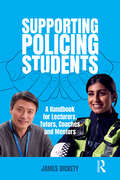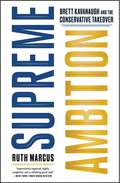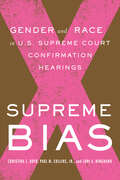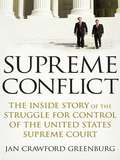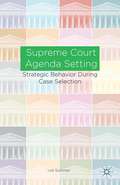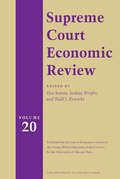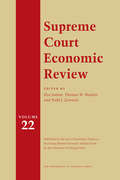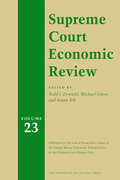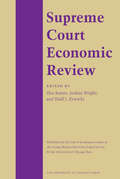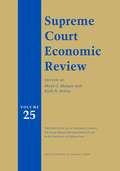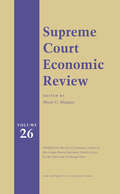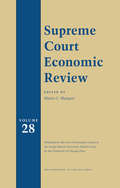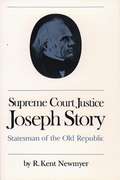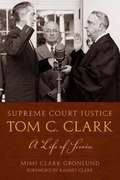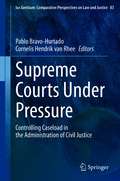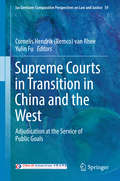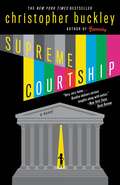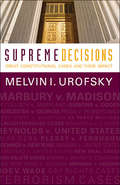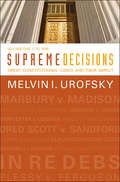- Table View
- List View
Supporting Policing Students: A Handbook for Lecturers, Tutors, Coaches and Mentors
by James DicketyThis is an invaluable guide for those involved in supporting policing students, including lecturers, tutors, trainers, mentors and coaches. It integrates quality research and practice to help anyone in these roles provide optimal support and guidance to their policing students. Shaping the next generation of policing officers and staff comes with a unique set of challenges, so chapters cover a myriad of useful subjects related to coaching models and theories and how to apply these in a policing context. Additionally, you will find insightful teaching tips, including effective feedback strategies and guidance on addressing challenging topics like domestic abuse and courtroom appearances. Accessibly written, this book can be explored from start to finish or used as a reference guide, and includes reflective exercises and real-life policing examples to help you apply theory to practice, creating an enriching learning experience for both you and your students.
Suppressing the Financing of Terrorism
by International Monetary FundA report from the International Monetary Fund.
Supreme Ambition: Brett Kavanaugh and the Conservative Takeover
by Ruth MarcusThe Republicans began plotting their takeover of the Supreme Court thirty years ago. Brett Kavanaugh set his sights on the court right out of law school. Washington Post journalist and legal expert Ruth Marcus goes behind the scenes to document the inside story of how their supreme ambition triumphed. The Kavanaugh drama unfolded so fast in the summer of 2018 it seemed to come out of nowhere. With the power of the #MeToo movement behind her, a terrified but composed Christine Blasey Ford walked into a Senate hearing room to accuse Kavanaugh of sexual assault. This unleashed unprecedented fury from a Supreme Court nominee who accused Democrats of a &“calculated and orchestrated political hit.&” But behind this showdown was a much bigger one. In Supreme Ambition, Washington Post journalist and legal expert Ruth Marcus goes behind the scenes to document the thirty-year mission by conservatives to win a majority on the Supreme Court and the lifelong ambition of Brett Kavanaugh to secure his place in that victory. In that sense, Marcus has delivered a master class in how Washington works and an unforgettable case study in supreme ambition. The reporting in Supreme Ambition is also full of revealing and weighty headlines, as Marcus answers the most pressing questions surrounding this historical moment: How did Kavanaugh get the nomination? Was Blasey Ford&’s testimony credible? What does his confirmation mean for the future of the court? Were the Democrats outgunned from the start? On the way, she uncovers secret White House meetings, intense lobbying efforts, private confrontations on Capitol Hill, and lives forever upended on both coasts. Supreme Ambition is a page-turner that traces how Brett Kavanaugh deftly maneuvered to become the nominee; how he quashed resistance from Republicans who worried he was too squishy on conservative issues and from a president reluctant to reward a George W. Bush loyalist. It shows a Republican party that had concluded Kavanaugh was too big to fail, with senators and the FBI ignoring potentially devastating evidence against him. And it paints a picture of Democratic leaders unwilling to engage in the no-holds-barred partisan warfare that might have defeated the nominee. In the tradition of The Brethren and The Power Broker, Supreme Ambition is the definitive account of a pivotal moment in modern history, one that was thirty years in the making and that will shape the judicial system of America for generations to come.
Supreme Bias: Gender and Race in U.S. Supreme Court Confirmation Hearings
by Paul M. Collins Jr Lori Ringhand Christina BoydIn Supreme Bias, Christina L. Boyd, Paul M. Collins, Jr., and Lori A. Ringhand present for the first time a comprehensive analysis of the dynamics of race and gender at the Supreme Court confirmation hearings held before the Senate Judiciary Committee. Drawing on their deep knowledge of the confirmation hearings, as well as rich new qualitative and quantitative evidence, the authors highlight how the women and people of color who have sat before the Committee have faced a significantly different confirmation process than their white male colleagues. Despite being among the most qualified and well-credentialed lawyers of their respective generations, female nominees and nominees of color face more skepticism of their professional competence, are subjected to stereotype-based questioning, are more frequently interrupted, and are described in less-positive terms by senators. In addition to revealing the disturbing extent to which race and gender bias exist even at the highest echelon of U.S. legal power, this book also provides concrete suggestions for how that bias can be reduced in the future.
Supreme Conflict: The Inside Story of the Struggle for Control of the United States Supreme Court
by Jan Crawford GreenburgDrawing on unprecedented access to the Supreme Court justices themselves and their inner circles, acclaimed ABC News legal correspondent Jan Crawford Greenburg offers an explosive newsbreaking account of one of the most momentous political watersheds in American history. From the series of Republican nominations that proved deeply frustrating to conservatives to the decades of bruising battles that led to the rise of Justices Roberts and Alito, this is the authoritative story of the conservative effort to shift the direction of the high court--a revelatory look at one of the central fronts of America's culture wars by one of the most widely respected experts on the subject. .
Supreme Court Agenda Setting
by Udi SommerMuch research is devoted to the decision-making power and precedent set by the Supreme Court. Less attention, however, is given to the strategic behavior during case selection. This book argues that case selection is done strategically, and by means of various criteria - influencing its constitutional position and importance.
Supreme Court Confirmation Hearings and Constitutional Change
by Paul M. Collins Lori A. RinghandBefore Supreme Court nominees are allowed to take their place on the High Court, they must face a moment of democratic reckoning by appearing before the Senate Judiciary Committee. Despite the potential this holds for public input into the direction of legal change, the hearings are routinely derided as nothing but empty rituals and political grandstanding. In this book, Paul M. Collins and Lori A. Ringhand present a contrarian view that uses both empirical data and stories culled from more than seventy years of transcripts to demonstrate that the hearings are a democratic forum for the discussion and ratification of constitutional change. As such, they are one of the ways in which 'We the People' take ownership of the Constitution by examining the core constitutional values of those permitted to interpret it on our behalf.
Supreme Court Economic Review, Volume 20 (Supreme Court Economic Review #20)
by The University of Chicago PressThe Supreme Court Economic Review is an interdisciplinary journal that seeks to provide a forum for scholarship in law and economics, public choice, and constitutional political economy. Its approach is broad ranging, and contributions employ explicit or implicit economic reasoning for the analysis of legal issues, with special attention to Supreme Court decisions, judicial process, and institutional design.
Supreme Court Economic Review, Volume 22
by Michael S. Greve Todd J. Zywicki Thomas W. HazlettSupreme Court Economic Review is an interdisciplinary journal that seeks to provide a forum for scholarship in law and economics, public choice, and constitutional political economy. Its approach is broad ranging and contributions employ explicit or implicit economic reasoning for the analysis of legal issues, with special attention to Supreme Court decisions, judicial process, and institutional design.
Supreme Court Economic Review, Volume 22 (Supreme Court Economic Review #22)
by The University of Chicago PressSupreme Court Economic Review is an interdisciplinary journal that seeks to provide a forum for scholarship in law and economics, public choice, and constitutional political economy. Its approach is broad ranging and contributions employ explicit or implicit economic reasoning for the analysis of legal issues, with special attention to Supreme Court decisions, judicial process, and institutional design.
Supreme Court Economic Review, Volume 23 (Supreme Court Economic Review #23)
by The University of Chicago PressSupreme Court Economic Review is a faculty-edited, peer-reviewed, interdisciplinary series that applies world class economic and legal scholarship to the work of the Supreme Court of the United States. Contributions typically provide an economic analysis of the events that generated the Court's cases, its functioning as an organization, the reasoning the Court employs in reaching its decisions, and the societal impact of these verdicts. Beyond academic analysis, SCER contributors stimulate interest in the economic dimension of the Supreme Court and explore solutions for its manifold and complex problems.
Supreme Court Economic Review, Volume 24 (Supreme Court Economic Review #24)
by The University of Chicago PressThe Supreme Court Economic Review is a faculty-edited, peer-reviewed, interdisciplinary law and economics series with a particular focus on economic and social science analysis of judicial decision making, institutional analysis of law and legal structures, political economy and public choice issues regarding courts and other decision-makers, and the relationship between legal and political institutions and the institutions of a free society governed by constitutions and the rule of law. Contributors include renowned legal scholars, economists, and policy-makers, and consistently ranks among the most influential journals of law and economics.
Supreme Court Economic Review, Volume 25 (Supreme Court Economic Review #25)
by The University of Chicago PressThe Supreme Court Economic Review is a faculty-edited, peer-reviewed, interdisciplinary law and economics series with a particular focus on economic and social science analysis of judicial decision making, institutional analysis of law and legal structures, political economy and public choice issues regarding courts and other decision-makers, and the relationship between legal and political institutions and the institutions of a free society governed by constitutions and the rule of law. Contributors include renowned legal scholars, economists, and policy-makers, and consistently ranks among the most influential journals of law and economics.
Supreme Court Economic Review, Volume 26 (Supreme Court Economic Review #26)
by The University of Chicago PressThe Supreme Court Economic Review (SCER) is a faculty-edited, peer-reviewed, interdisciplinary law and economics series. The journal has a particular focus on economic and social science analysis of judicial decision-making, institutional analysis of law and legal structures, political economy and public choice issues regarding courts and other decision-makers, and the relationship between legal and political institutions and the institutions of a free society governed by constitutions and the rule of law. The series also publishes special symposium issues that build on SCER's traditional focus on the intersection between law and economics. The contributors include renowned legal scholars, economists, and policy-makers, and consistently ranks among the most influential journals of law and economics.
Supreme Court Economic Review, Volume 27 (Supreme Court Economic Review #27)
by The University of Chicago PressThe Supreme Court Economic Review (SCER) is a faculty-edited, peer-reviewed, interdisciplinary law and economics series. The journal has a particular focus on economic and social science analysis of judicial decision-making, institutional analysis of law and legal structures, political economy and public choice issues regarding courts and other decision-makers, and the relationship between legal and political institutions and the institutions of a free society governed by constitutions and the rule of law. The series also publishes special symposium issues that build on SCER's traditional focus on the intersection between law and economics. The contributors include renowned legal scholars, economists, and policy-makers, and consistently ranks among the most influential journals of law and economics.
Supreme Court Justice Joseph Story
by R. Kent NewmyerThe primary founder and guiding spirit of the Harvard Law School and the most prolific publicist of the nineteenth century, Story served as a member of the U.S. Supreme Court from 1811 to 1845. His attitudes and goals as lawyer, politician, judge, and legal educator were founded on the republican values generated by the American Revolution. Story's greatest objective was to fashion a national jurisprudence that would carry the American people into the modern age without losing those values.
Supreme Court Justice Tom C. Clark
by Mimi Clark GronlundAn associate justice on the renowned Warren Court whose landmark ruling in Brown v. Board of Education overturned racial segregation in schools and other public facilities, Tom C. Clark was a crusader for justice throughout his long legal career. Among many tributes Clark received, Supreme Court Chief Justice Warren Burger opined that "no man in the past thirty years has contributed more to the improvement of justice than Tom Clark. " Supreme Court Justice Tom C. Clark is the first biography of this important American jurist. Written by his daughter, Mimi Clark Gronlund, and based on interviews with many of Clark's judicial associates, friends, and family, as well as archival research, it offers a well-rounded portrait of a lawyer and judge who dealt with issues that remain in contention today--civil rights, the rights of the accused, school prayer, and censorship/pornography, among them. Gronlund explores the factors in her father's upbringing and education that helped form his judicial philosophy, then describes how that philosophy shaped his decisions on key issues and cases, including the internment of Japanese Americans during World War II, the investigation of war fraud, the Truman administration's loyalty program (an anti-communist effort), the Brown decision, Mapp v. Ohio (protections against unreasonable search and seizure), and Abington v. Schempp (which overturned a state law that required reading from the Bible each day in public schools).
Supreme Courts Under Pressure: Controlling Caseload in the Administration of Civil Justice (Ius Gentium: Comparative Perspectives on Law and Justice #83)
by Cornelis Hendrik van Rhee Pablo Bravo-HurtadoThis book discusses civil litigation at the supreme courts of nine jurisdictions – Argentina, Austria, Croatia, England and Wales, France, Germany, Italy, Spain and the United States – and focuses on the available instruments used to keep the caseload of these courts within acceptable limits. Such instruments are necessary in order to allow supreme courts to fulfil their main duties, that is, the administration of justice in individual cases (private function) and providing for the uniformity and development of the law within their respective jurisdictions (public function). If the number of cases at the supreme court level is too high, the result is undue delays, which are mainly problematic with regard to the private function. It may also put the quality of the court’s judgments under pressure, which can affect its public and private function alike. Thus, measures aimed at avoiding excessive caseloads need to take both functions into account. Increasing the capacity of the court to handle larger numbers of cases may result in the court being unable to adequately fulfil its public function, since large numbers of court decisions make it difficult to guarantee the uniformity of the law and its development. Therefore, a balanced approach is needed to safeguard capacity and quality. As shown by the contributions gathered here, the nature of reform in this area is not the same everywhere. There are a variety of reasons for this heterogeneity, ranging from different understandings of the caseload problem itself, local conceptions regarding the purpose of the Supreme Court, and strong entitlements concerning the right to appeal to budgetary restrictions and extremely rigid legislation. The book also shows that the implementation of similar solutions to case overload, such as access filters, may have different effects in different jurisdictions. The conclusion might well be that the problem of overburdened courts is multifactorial and context-dependent, and that easy, one-size-fits-all solutions are hard to find and perhaps even harder to implement.
Supreme Courts in Transition in China and the West
by Cornelis Hendrik Remco Rhee Yulin FuThis edited volume looks at supreme courts in China and the West. It examines the differences and similarities between the Supreme People's Court of Mainland China and those that follow Western models. It also offers a comparative study of a selection of supreme courts in Europe and Latin America. The contributors argue that the Supreme Courts should give guidance to the development of the law and provide legal unity. For China, the Chinese author argues, that therefore there should be more emphasis on the procedure for reopening cases. The chapters on Western-style supreme courts argue that there should be adequate access filters; the procedure of reopening cases is considered to be problematic from the perspective of the finality of the administration of justice. In addition, the authors discuss measures that allow supreme courts in both regions to deal with their existing caseload, to reduce this caseload, and to avoid divergences in the case law of the supreme court. This volume offers ideas that will help supreme courts in both the East and the West to remove unmanageable caseloads. As a result, these courts will be better able to assist in the interpretation and clarification of the law, to provide for legal unity, and to give guidance to the development of the law.
Supreme Courtship
by Christopher BuckleyPresident of the United States Donald Vanderdamp is having a hell of a time getting his nominees appointed to the Supreme Court. After one nominee is rejected for insufficiently appreciating To Kill A Mockingbird, the president chooses someone so beloved by voters that the Senate won't have the guts to reject her -- Judge Pepper Cartwright, the star of the nation's most popular reality show, Courtroom Six. Will Pepper, a straight-talking Texan, survive a confirmation battle in the Senate? Will becoming one of the most powerful women in the world ruin her love life? And even if she can make it to the Supreme Court, how will she get along with her eight highly skeptical colleagues, including a floundering Chief Justice who, after legalizing gay marriage, learns that his wife has left him for another woman. Soon, Pepper finds herself in the middle of a constitutional crisis, a presidential reelection campaign that the president is determined to lose, and oral arguments of a romantic nature. Supreme Courtship is another classic Christopher Buckley comedy about the Washington institutions most deserving of ridicule.
Supreme Decisions (Combined Volume): Great Constitutional Cases and Their Impace
by Melvin I. UrofskySupreme Decisions: Great Constitutional Cases and Their Impact covers twenty-three Supreme Court cases that have shaped American constitutional law. Interpretive chapters shed light on the nuances of each case, the individuals involved, and the social, political, and cultural context at that particular moment in history. Discussing cases from nearly every decade in a two-hundred-year span, Melvin I. Urofsky expounds on the political climate of the United States from the country’s infancy through the new millennium. Featuring Marbury v. Madison, Dred Scott v. Sandford, Miranda v. Arizona, Brown v. Board of Education, and many more, this text covers foundational rulings and more recent decisions. Written with students in mind, Melvin I. Urofsky’s voice offers compelling and fascinating accounts of American legal milestones.
Supreme Decisions, Combined Volume
by Melvin I. UrofskySupreme Decisions: Great Constitutional Cases and Their Impact covers twenty-three Supreme Court cases that have shaped American constitutional law. Interpretive chapters shed light on the nuances of each case, the individuals involved, and the social, political, and cultural context at that particular moment in history. Discussing cases from nearly every decade in a two-hundred-year span, Melvin I. Urofsky expounds on the political climate of the United States from the country's infancy through the new millennium. Featuring Marbury v. Madison, Dred Scott v. Sandford, Miranda v. Arizona, Brown v. Board of Education, and many more, this text covers foundational rulings and more recent decisions. Written with students in mind, Melvin I. Urofsky's voice offers compelling and fascinating accounts of American legal milestones.Supreme Decisions can be purchased as a single combined volume or conveniently split into two volumes, providing a breadth of information for survey courses in U.S. Constitutional History.
Supreme Decisions, Combined Volume
by Melvin I. UrofskySupreme Decisions: Great Constitutional Cases and Their Impact, Volumes 1 and 2, covers twenty-four Supreme Court cases (twelve per volume) that have shaped American constitutional law. Interpretive chapters shed light on the nuances of each case, the individuals involved, and the social, political, and cultural context at that particular moment in history. Discussing cases from nearly every decade in a two-hundred-year span, Melvin I. Urofsky expounds on the political climate of the United States from the country's infancy through the new millennium. Featuring Marbury v. Madison, Dred Scott v. Sandford, Miranda v. Arizona, Brown v. Board of Education, and many more, this text covers foundational rulings and more recent decisions. Written with students in mind, Melvin I. Urofsky's voice offers compelling and fascinating accounts of American legal milestones. Supreme Decisions can be purchased as a single combined volume or conveniently split into two volumes, providing a breadth of information for survey courses in U. S. Constitutional History.
Supreme Decisions, Volume 1
by Melvin I. UrofskySupreme Decisions: Great Constitutional Cases and Their Impact, Volumes 1 and 2, covers twenty-four Supreme Court cases (twelve per volume) that have shaped American constitutional law. Interpretive chapters shed light on the nuances of each case, the individuals involved, and the social, political, and cultural context at that particular moment in history. Discussing cases from nearly every decade in a two-hundred-year span, Melvin I. Urofsky expounds on the political climate of the United States from the country's infancy through the new millennium. Featuring Marbury v. Madison, Dred Scott v. Sandford, Miranda v. Arizona, Brown v. Board of Education, and many more, this text covers foundational rulings and more recent decisions. Written with students in mind, Melvin I. Urofsky's voice offers compelling and fascinating accounts of American legal milestones. Supreme Decisions can be purchased as a single combined volume or conveniently split into two volumes, providing a breadth of information for survey courses in U. S. Constitutional History.
Supreme Decisions, Volume 1
by Melvin I. UrofskySupreme Decisions: Great Constitutional Cases and Their Impact, Volumes 1 and 2, covers twenty-four Supreme Court cases (twelve per volume) that have shaped American constitutional law. Interpretive chapters shed light on the nuances of each case, the individuals involved, and the social, political, and cultural context at that particular moment in history. Discussing cases from nearly every decade in a two-hundred-year span, Melvin I. Urofsky expounds on the political climate of the United States from the country's infancy through the new millennium. Featuring Marbury v. Madison, Dred Scott v. Sandford, Miranda v. Arizona, Brown v. Board of Education, and many more, this text covers foundational rulings and more recent decisions. Written with students in mind, Melvin I. Urofsky's voice offers compelling and fascinating accounts of American legal milestones.Supreme Decisions can be purchased as a single combined volume or conveniently split into two volumes, providing a breadth of information for survey courses in U.S. Constitutional History.
